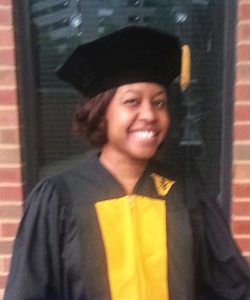
Jillian Pope, Ph.D.
Department: Cancer Biology, 2014
Faculty Mentor: Punita Dhawan, Ph.D.
Dissertation Title: The Role of Claudin-1 in Inflammation and Colon Cancer
Dissertation Abstract: Perturbation of physiological processes stimulate a cascade of events resulting in adverse pathogical conditions, the most predominant being cancer. Colorectal cancer (CRC) is the third most common cancer in the United States and the third leading cause of cancer deaths among men and women. CRC is most commonly initiated by mutation of Adenomatous polyposis coli (APC), a tumor suppressor gene of the Wingless/Wnt pathway, which leads to constitutive activation of Wnt signaling responsible for the majority of CRC cases. Although significant progress has been made in understanding the sequential genetic events leading to cancer development, the precise genes and associated molecular events underlying tumor progression are still poorly understood. Our lab has previously reported a correlation between increased expression of claudin-1, a tight junction protein, in primary and metastatic tumor samples of CRC patients. Additionally, in adenomas of the APCMin mouse, an experimental model for CRC, and human cell lines harboring mutations in APC, claudin-1 expression is highly increased and mislocalized. Taken together, these studies suggest existence of a potential interplay between dysregulated claudin-1 expression and APC, thus supporting an essential role in the regulation of sporadic colonic neoplasia. In addition to genetic stimuli, CRC can be initiated by an inflammatory stimulus. Patients with inflammatory bowel disease, a chronic disorder of the gastrointestinal tract, are at high risk for developing CRC. This may be attributed, in part, to repeated injury and repair, which induces transformation of the colonic epithelium. As such, increased Claudin-1 expression is also reported to be associated with active IBD and colitis-associated cancer, yet its distinct role in inflammation has yet to be elucidated. This study investigates the specific contribution of increased claudin-1 expression to inflammation and CRC. These results identify a role for Claudin-1 in epithelial differentiation through a novel interaction with Notch signaling. Additionally, claudin-1 enhances tumorigenesis through upregulation of inflammation, IL-23/IL17 signaling, when combined with mutant APC. Once understood how overexpression claudin-1 contributes to tumor progression, we can better investigate its potential as a target for therapy.
